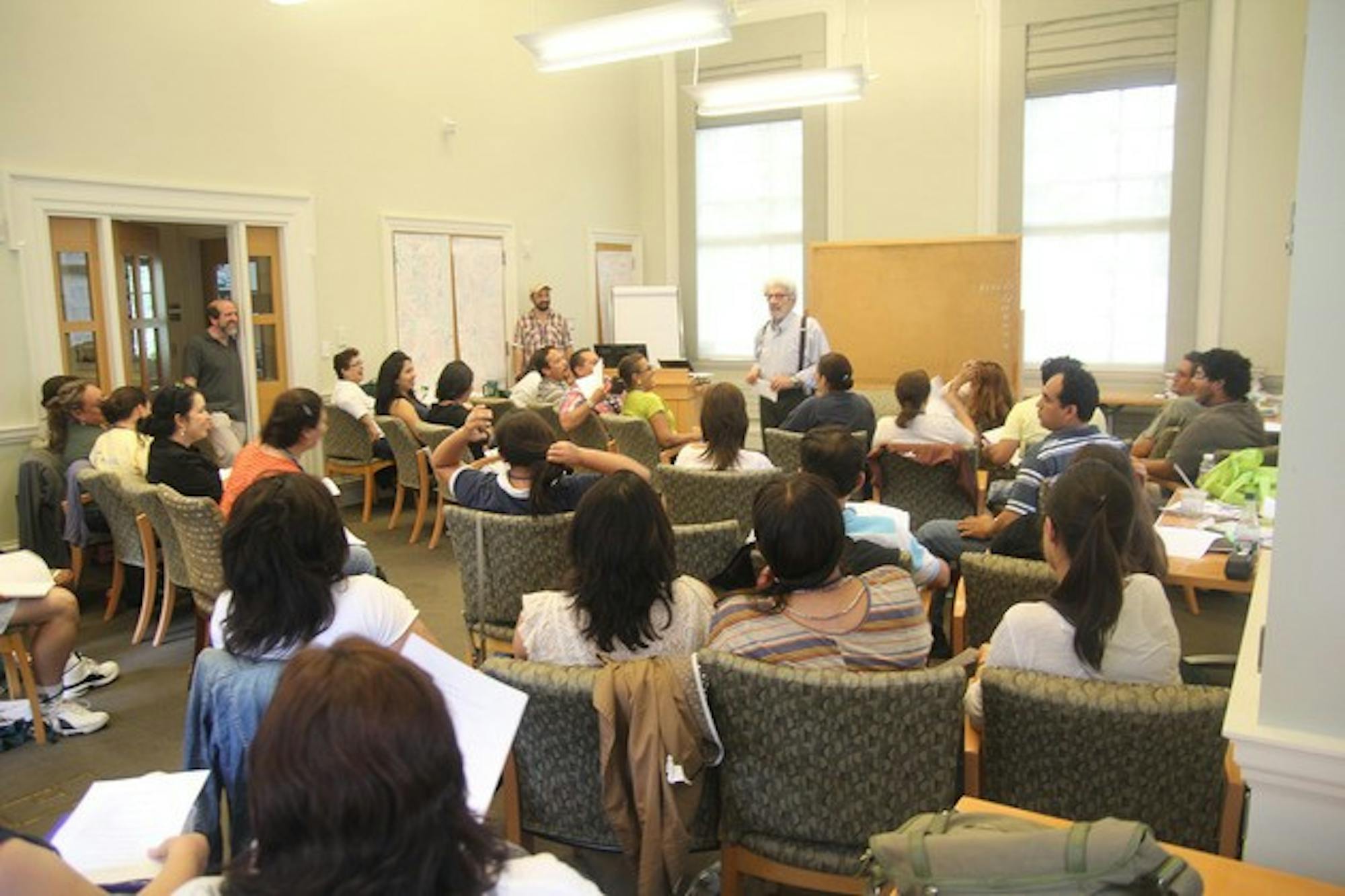Forty men and women from various Mexican public schools and colleges are at Dartmouth from July 15 to 29 as part of the Inter-American Partnership for Education, a collaboration between the Rassias Center for World Languages and Culture and Worldfund, an organization that aims to fight poverty in Latin America through increased educational opportunities.
Founded in the fall of 2007, the IAPE Teacher's Collaborative sponsors English language training for teachers in Mexico, utilizing both the Rassias method and other teaching techniques, according to intercultural education specialist and IAPE director Jim Citron '86, who has worked with the program since its inception. The Rassias method is designed to advance speaking proficiency by using real-world situations and breaking down inhibitions about speaking a foreign language.
"We have 1,000 teachers who have gone through the program, and through them we're reaching approximately 250,000 students per year," Citron said. "We're all in this together and it's a real partnership between the Rassias Center, Worldfund and all the teachers involved."
The program is committed to ensuring that the teachers are able to bring back what they have learned to their own communities, Citron said. In addition to the Hanover program, IAPE hosts intensive language instruction workshops in Mexico, led by both Mexican and American teachers.
"The ultimate mission is to prepare and empower a group of English teachers to work together to transform English instruction in Mexico," Citron said.
Last year, Raul Lopez, who participated in the teachers' collaborative pilot program in 2008, became the on-site language instruction coordinator in Mexico. Citron said his transition has been "amazing."
"The program changed my life and the way I was teaching," Lopez said. "It helped me to understand and care about my students and gave me the opportunity to help them get involved in the classes."
A typical day for program participants includes lectures, seminars and workshops with Dartmouth faculty, in addition to regular practice using the Rassias method. The IAPE program, which touches on 50 different techniques, includes eight days of intensive English instruction and two days of Rassias techniques, according to Rassias.
The current violent climate in many parts of Mexico makes programs like IAPE even more important, according to Citron.
"It's no secret that the crime situation in Mexico has become a real concern," he said. "Programs like this can help get students hooked on education and try to stay in school. They can see that there are legal, virtuous and positive ways to make a living and provide for their families, and that's a real social value."
The fundamental state of English language instruction in Mexico "really needs help", according to Worldfund Chief Operating Officer and Chief Financial Officer Mary Bourque '87.
"We view bringing good English language instruction as a true practical skill for these students to learn," Bourque said. "Given Mexico's proximity to the United States, as well as the frequency of cross-country business relationships and the role of tourism, teaching a student in Mexico how to speak English gives them an incredibly important job skill. With the Rassias method, students can leave an English language class actually speaking English, which they are not right now."
Worldfund works with the Rassias Center to provide funding from U.S. and Mexico-based corporations, foundations and private individuals, according to Bourque. The organization also works closely with the Mexican government by coordinating with state education officials to ensure that the programs can occur.
Dealing with the Mexican government can logistical present challenges, according to Citron. IAPE works with individual state governments to secure visas and make all the necessary arrangements for the teachers to visit Hanover, but high rates of political turnover can make it difficult to establish continuity, he said.
Close cooperation with Worldfund and the positive response from participants is enough to mitigate these challenges, according to Rassias Center Executive Director Helene Rassias-Miles.
"At first we didn't know how the teachers would react to getting all these techniques and information all at once, but they absorbed it completely and were clamoring for more," Rassias-Miles said. "These teachers are so hard-working, and they take what we give them and run with it. It's crazy how something that's grown so fast can still feel personal."
In the five years since IAPE began, it has grown from 20 teachers to almost 1,000, according to Citron. Citron, Rassias-Miles and Worldfund are currently working together to begin a teacher-training program in Mexico that would allow Rassias-taught participants to spread the information to their colleagues, according to Rassias-Miles.
"The teachers have always been thinking about what they could do next for their schools and their communities, and now some of them will be leading workshops as early as mid-August," she said. "For us, the deepest part of it is getting this to stay and expand in the community, and how we can work together to make things in Mexico grow."
The program is "life-changing" for its participants, according to Victor Luis Montejo, an elementary school teacher in Acapulco de Guerrero, Mexico.
"It's not just about the teaching techniques, it's actually about being more aware of our students' needs," Montejo said. "It makes me think of the people back in Mexico and the commitment that I have to them to share what I've learned here. It's a privilege for me to be part of this event."
Throughout the year, the Inter-American Development Bank will conduct a randomized controlled study of the IAPE program to determine its effectiveness, according to Bourque.
"The true gold standard in evaluating any education program is a randomized controlled trial and this is the first randomized controlled trial of a teacher training program ever done in North America," Bourque said. "Worldwide, there have been very few randomized controlled trials done in teacher training, so this is a big deal globally."




